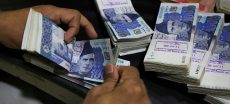[vc_row][vc_column][vc_column_text dp_text_size=”size-4″]Starting February 1, 2024, Pakistan’s interim government is anticipating a notable increase in petrol and diesel prices for the initial half of the month. This surge is directly linked to heightened tensions in the Middle East, specifically arising from the Israeli bombardment of Gaza and attacks on Yemen’s Houthi forces. The global market has swiftly responded to these conflicts, resulting in a significant upswing in both motor gasoline (petrol) and diesel prices.
The anticipated increments are approximately Rs7.85 per litre for petrol and Rs2.06 per litre for high-speed diesel (HSD). The ex-refinery prices of petrol and HSD in Pakistan have experienced substantial increases due to these international events. Petrol prices have soared from Rs187.74 to Rs269.94 per litre, while HSD prices have climbed from Rs201.79 to Rs282.77 per litre. Accounting for the international price surge, this equates to a local hike of Rs10.60 per litre for petrol and Rs6.56 per litre for HSD.
Read more: What Will Be The Petrol Prices In Pakistan From February 1?
Taking into consideration adjustments in the exchange rate, the expected uptick in petrol price is Rs7.85 per litre, and for HSD, it is Rs2.06 per litre. It’s worth noting that kerosene prices may witness a decline. The government presently imposes various charges on petrol and diesel, including a petroleum development levy (PDL) of Rs60 per litre. Consumers also shoulder additional charges such as IFEM, OMCs margin, and dealers’ margin.
In the preceding two weeks, the government had implemented a reduction in petrol prices by Rs8 per litre, bringing it down to Rs259.3. However, the diesel rate remained steady at Rs276.21 per litre. Notably, there were also reductions in the rates of kerosene oil and light diesel oil in the latest revision.
These adjustments underscore the intricate interplay of international geopolitical events, exchange rate fluctuations, and domestic policies, all of which collectively impact the energy landscape in Pakistan. Consumers are poised to experience the ramifications of these changes in their daily lives and expenditures. The fluctuations in fuel prices serve as a barometer of the dynamic and interconnected nature of global and domestic factors influencing Pakistan’s energy market.[/vc_column_text][/vc_column][/vc_row]











